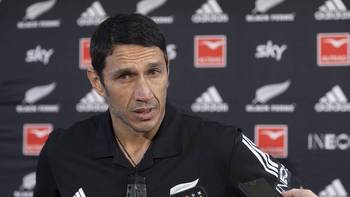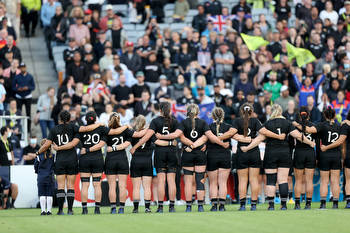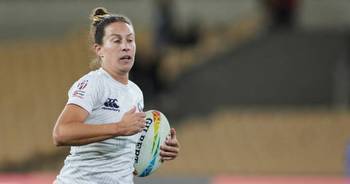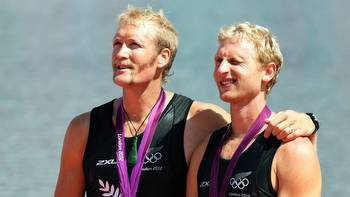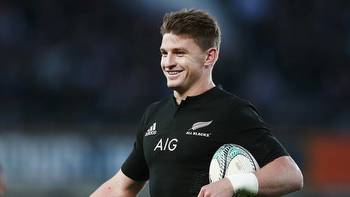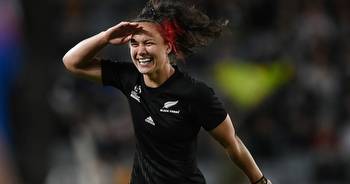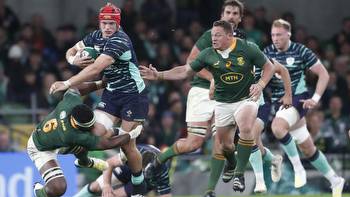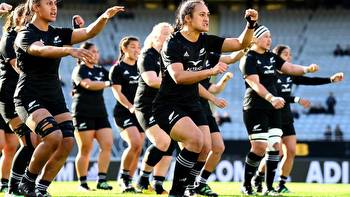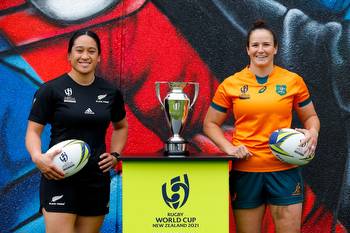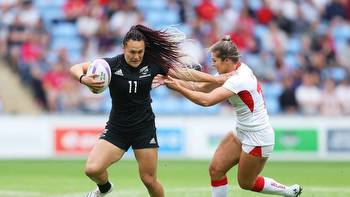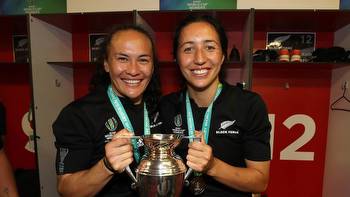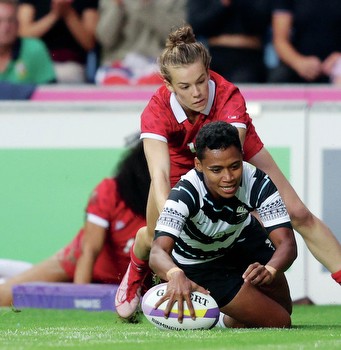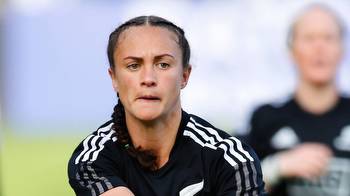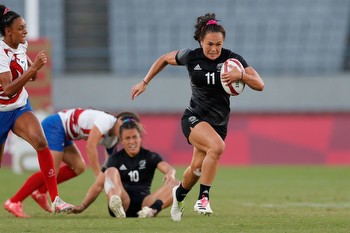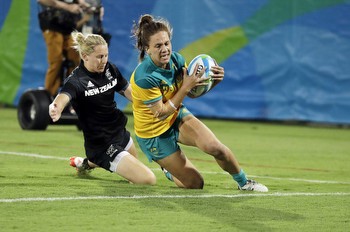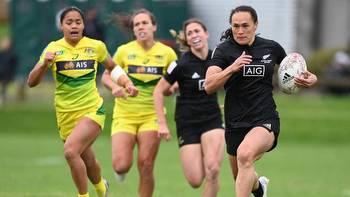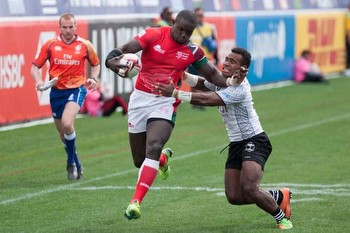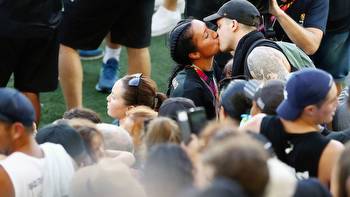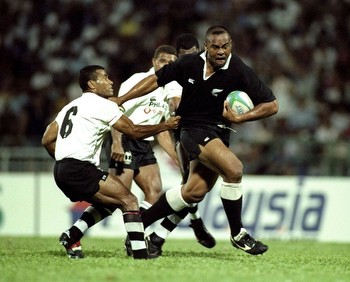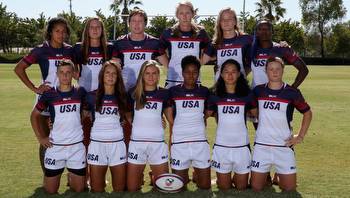Rugby's fastest man; Portia Woodman's comeback: Seven sevens stars at the Tokyo Olympics

Neither won gold at the inaugural sevens tournament at the 2016 Rio Games, but they are among the favourites after victories at the Commonwealth Games and the Sevens World Cup in 2018.
The men’s team, the All Blacks sevens, who finished fifth in Rio, face stiff competition from Olympic champions Fiji, while the women’s team, the Black Ferns sevens, are at short odds for gold after dominating the game since claiming silver with their loss to Australia in the 2016 Olympic final.
has chosen seven sevens stars to watch ahead of the men’s tournament kicking off on Monday, with the women’s event starting on Thursday, and selected two players from each Kiwi team with three from other nations.
Among those to watch is rugby’s fastest man, Carlin Isles, who will be dashing around Tokyo for the United States, while the Black Ferns sevens are boosted by the return of one of women’s rugby superstars, Portia Woodman, who missed two and a half years of international action because of injury.
All Blacks sevens
Andrew Knewstubb
The 25-year-old from Tasman has been one of their most quietly consistent performers since his national debut in 2017 and was the leading points scorer, with 309, for the last completed World Series in 2018/19. The last series was cancelled in 2020 because of Covid-19.
Knewstubb is adept at playing in multiple positions, which coach Clark Laidlaw wants from his squad for their Olympic campaign, and he has experience of big events after playing in the winning teams at the Commonwealth Games and the Sevens World Cup in 2018.
In the 15-a-side game, he played for Canterbury in last year’s Mitre 10 Cup when sevens was paused by the pandemic.
Tim Mikkelson
There are not many active sevens players with a CV as strong as Mikkelson, the most capped All Blacks sevens player in history, with more than 450 games since his debut in 2008.
The 34-year-old from Waikato has won almost everything in the game’s shorter form, as an individual as well as team honours, and Toyko is likely to be his last shot at the game’s biggest prize after missing out on a medal in Rio.
He has two Sevens World Cup and Commonwealth Games gold medals respectively, but Olympic gold would top the lot, making up for the team’s failure at the Rio Games.
Black Ferns sevens
Michaela Blyde
The 25-year-old from Taranaki won successive titles as the best player in the world in sevens, in 2017 and 2018, with her superb speed, line breaks and tackle busts making her one of the game’s most effective strike wingers.
Blyde scores tries for fun and is difficult for any defence to catch in open space, which has been a feature of the team’s superiority on the global stage, and she has collected multiple individual accolades since her debut in 2016.
She was a travelling reserve in Rio five years ago but is set for an important role as the Black Ferns sevens go for their first Olympic gold medal. She was part of the triumphs in 2018 at the Commonwealth Games and the Sevens World Cup.
Portia Woodman
Woodman is on a mission after her tears in Rio. The sight of her slumped to the turf in despair after losing the gold medal match to Australia epitomised the disappointment of the Kiwi women’s team in 2016.
The 30-year-old from Northland played in the 2018 successes at the Commonwealth Games and the Sevens World Cup, but a ruptured Achilles suffered later that year was only the start of her two-and-a-half-year absence from the international game because of injury.
Fit and firing again, she has demonstrated that she is approaching her best form after returning for the Black Ferns sevens in May. Still, Tokyo will prove if the former world player of year, in 15s and sevens, is as good as she ever was in her world-beating days before that awful run of injuries.
Charlotte Caslick (Australia women)
The 26-year-old Queenslander has fond memories of her first Olympics in Rio, having scored a try in the gold medal match to defeat to the Black Ferns sevens in 2016, and she will be key for the Aussies if they’re to upset the Kiwis in Tokyo.
Caslick, from a touch football background, has long been a star of Australian sevens on the World Series and switched to league last year in her NRL debut for the Sydney Roosters, although two small fractures in her back ended her season early.
The former world sevens player of the year is back for Australia’s Olympic campaign, seeking a second gold medal, and desperate to defeat a dominant New Zealand side but without her great mate, Ellia Green, who was a surprise omission from the Tokyo squad.
Carlin Isles (United States men)
Rugby’s fastest man, with a personal best of 10.13sec in the 100m sprint, Isles first transitioned to sevens in 2012 from a background of American football and athletics.
The 31-year-old has never looked back and was one of the stars of the World Series, along with fellow American speedster Perry Baker, until its shutdown because of the pandemic.
Isles is prominent in highlights reels because of his breathtaking pace, but there is tragedy behind his pursuit of a gold medal. In Tokyo, he will be honouring the memory of his late brother Chase, who was shot dead in their home state, Ohio, last November.
Semi Radradra (Fiji men)
Fiji, the reigning Olympic men’s champions, will have one of the game's most quality outside backs in Radradra, who has returned to sevens for the first time since 2018.
The 29-year-old has blossomed in rugby since switching from league in 2017 and the former Parramatta Eels winger is one of the most successful converts in the modern game.
Radradra is quick, powerful and skilful with excellent handling, but he will still have to cope with switching to sevens after domestic stints in 15s in France and England. His wish to win an Olympic gold medal with his homeland has been strong for a long time and Tokyo will be the ultimate test of his adaptability.
Another Fijian making his Olympic debut is former Wallabies test centre Samu Kerevi, who is in Australia’s squad.
Rugby Sevens at the Tokyo Olympics
All Blacks sevens
Squad: Tim Mikkelson (co-c), Scott Curry (co-c), Dylan Collier, Tone Ng Shiu, Amanaki Nicole, Andrew Knewstubb, Ngarohi McGarvey-Black, Sione Molia, Kurt Baker, Joe Webber, Etene Nanai-Seturo, Regan Ware.
Travelling reserves: William Warbrick, Caleb Clarke.
Men's pools (starting Monday)
Pool A: New Zealand, Australia, Argentina, South Korea.
Pool B: Fiji, Great Britain, Canada, Japan.
Pool C: South Africa, USA, Kenya, Ireland.
New Zealand schedule and knockout matches (NZ time)
Monday: South Korea at 1pm, Argentina at 8:30pm; Tuesday: Australia at 1:30pm, quarterfinals from 8:30pm; Wednesday: semifinals from 2pm, gold medal match at 9pm.
Black Ferns sevens
Squad: Portia Woodman, Sarah Hirini (c), Ruby Tui, Tyla Nathan-Wong, Theresa Fitzpatrick, Stacey Fluhler, Michaela Blyde, Alena Saili, Risaleaana Pouri-Lane, Kelly Brazier, Gayle Broughton, Shiray Kaka.
Travelling reserves: Tenika Willison, Jazmin Hotham, Terina Te Tamaki.
Women's pools (starting Thursday)
Pool A: New Zealand, Russian Olympic Committee, Great Britain, Kenya.
Pool B: Canada, France, Fiji, Brazil.
Pool C: Australia, USA, China, Japan.
New Zealand schedule and knockout matches (NZ time)
Thursday: Kenya at 2:30pm, Great Britain at 9:30pm; Friday: Russian Olympic Committee at 2:30pm; quarterfinals from 8:30pm; Saturday: semifinals from 2pm, gold medal match at 9pm.
.jpg)
